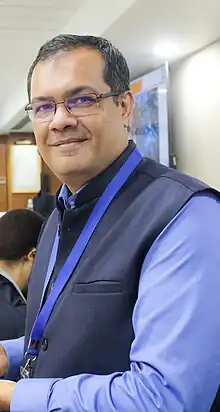Jaijit Bhattacharya | |
|---|---|
 Bhattacharya in 2023 | |
| President, Centre for Digital Economy Policy Research || Founder & CEO, Zerone Microsystems Pvt. Ltd. | |
| Personal details | |
| Born | 11 April 1972 India |
| Alma mater | IIT Kanpur (B.Tech.) Indian Institute of Management Calcutta (M.B.A.) Indian Institute of Technology Delhi (Ph.D.) |
| Profession | Public policy expert, Entrepreneur, Academician |
| Known for | Work in governance |
| Website | c-dep |
Jaijit Bhattacharya is an public policy expert, Indian entrepreneur and academician. He is the Founder and President of the Centre for Digital Economy Policy Research (C-DEP.org) and Founder and CEO of Zerone Microsystems Pvt. Ltd., a financial technology firm.
Career
He previously worked in senior roles in Accenture, IBM, Oracle, Sun Microsystems and HP and has been the Founding Partner of Catalyst Constellations LLP.[1][2]
Academic contributions
Jaijit Bhattacharya is on the Board of Directors of IIM Calcutta Innovation Park.[3][4] He contributed to initiatives such as Restructuring of the Indian Airforce based on the Shekatkar Committee report,[5] Ranking of States on Ease of Doing Business[6] by DIPP, conceptualization of Smart Cities by Ministry of Urban Development, Hriday initiative, ADB led Multi-modal Logistics Parks,[7] including in Jogighopa in Assam, creating the Smart City Plan for New Delhi Municipal Council, Programme Management for development of a Comprehensive Integrated Master Plan for the Four Industrial Nodes of the VCIC, Regulatory and Financial Due-diligence of education initiatives submitted to Ministry of Human Resources Development, Government of India, Program Management Unit for Swachh Bharat Mission (Urban), plan and strategy for rollout of unnat chulha[8] (improved cookstove) in rural India for MNRE (funded by GIZ) etc. He has been part of the World Bank initiative of South-Asian Digital connectivity[9] on areas of education, healthcare and e-governance.
He contributed to the National Policy on Open Standards.[10] He believes that control over standards is critical to avoid Digital Colonization.[11]
He is an author of the report "India Soars High" which compiled the initiatives of the government from an investor's perspective. The same was launched by the Honourable Prime Minister, Shri Narendra Modi as part of the Make in India[12] programme launch.
He advises governments on e-governance strategies. He has conducted training for ADB institute in Tokyo on Public Expenditure Management[13] and has helped World Bank develop curriculum for their e-Leadership program.[14]
Books
- E-Gov 2.0: Policies, Processes and Technologies, Tata McGraw Hill Education, 2011, ISBN 978-0070680173
- Privacy Middleware for Preserving Privacy in Databases, ISBN 978-3639202670
- Critical Thinking in E-governance, Gift Publishing, 2009, ISBN 9788190629430
References
- ↑ "Dr. Jaijit Bhattacharya view on Need for Anti-Dumping Duty Safeguards | NewsX | C-DEP". NewsX TV. Retrieved 27 July 2023.
- ↑ "Finnacle Capital Advisors". finnaclecapital.com. Retrieved 20 January 2021.
- ↑ "Digital Colonisation Explained by the Person Who Coined the Term in 2005". YouTube.
- ↑ "Home". IIMCIP. Retrieved 17 January 2021.
- ↑ "Report of Shekatkar Committee". pib.gov.in. Retrieved 17 January 2021.
- ↑ "Ease of Doing Business Reforms | Department for Promotion of Industry and Internal Trade | MoCI | GoI". dipp.gov.in. Retrieved 17 January 2021.
- ↑ https://www.adb.org/sites/default/files/publication/614876/adb-brief-142-multimodal-logistics-parks-india.pdf
- ↑ "Government making efforts to reduce dependence on traditional biomass cooking". pib.gov.in. Retrieved 20 January 2021.
- ↑ "Digital Development". World Bank. Retrieved 20 January 2021.
- ↑ "Policy on Open Standards for e-Governance" (PDF).
- ↑ Hicks, Jacqueline (29 September 2019). "'Digital colonialism': Why countries like India want to take control of data from Big Tech". ThePrint. Retrieved 20 January 2021.
- ↑ "Make in India: The vision, new processes, sectors, infrastructure, and mindset - Make In India". www.makeinindia.com. Retrieved 20 January 2021.
- ↑ Bank, Asian Development (30 June 2001). Public Expenditure Management: Training-of-Trainers Program. Vol. 45. Asian Development Bank.
- ↑ "Review of the World Bank Group's Staff Learning Framework" (PDF).